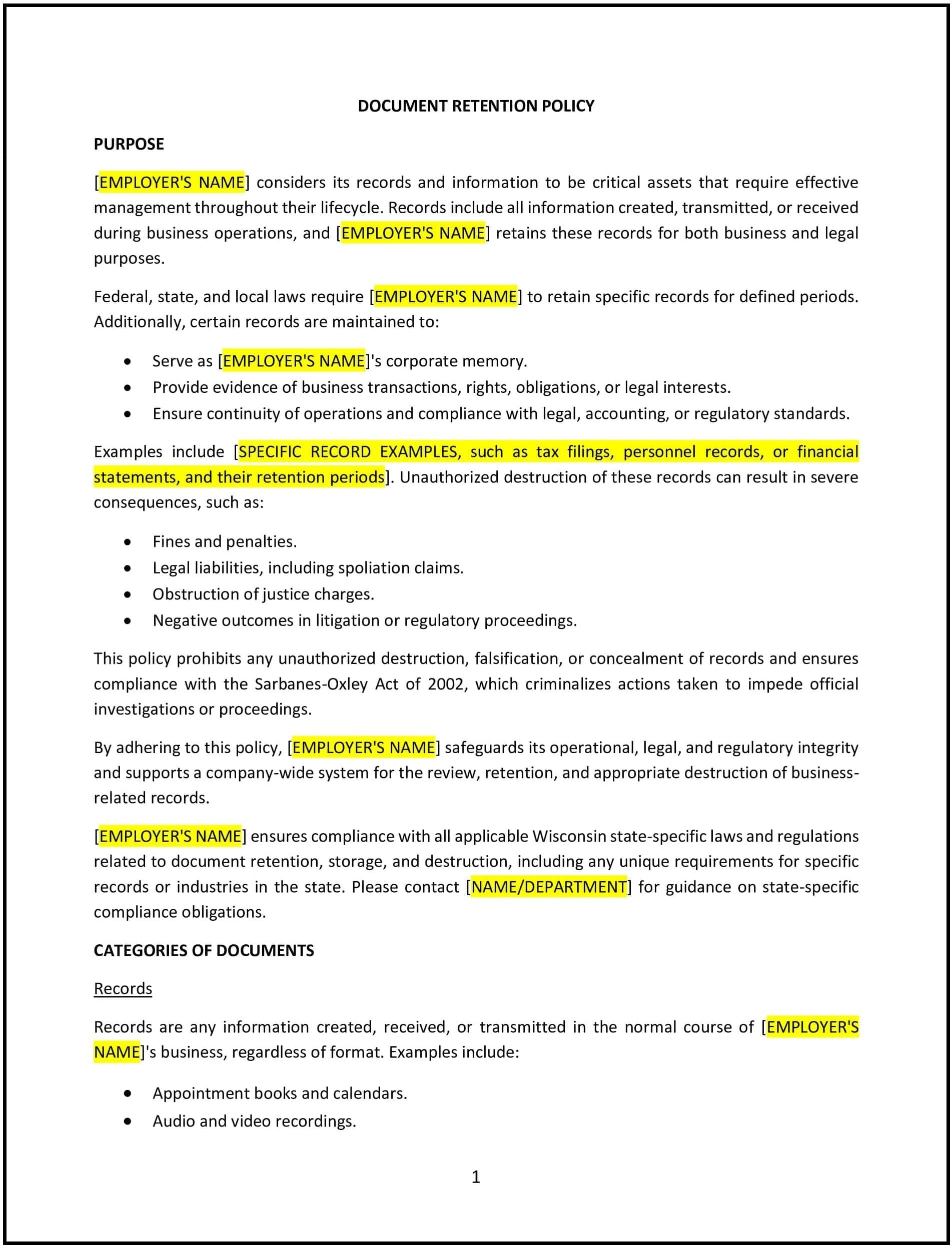Got contracts to review? While you're here for policies, let Cobrief make contract review effortless—start your free review now.

Customize this template for free
A document retention policy helps Wisconsin businesses establish clear guidelines for retaining, storing, and disposing of company records. This policy outlines the types of documents that need to be kept, the time periods for retaining them, and the procedures for securely disposing of records that are no longer needed. The policy supports compliance with legal and regulatory requirements while protecting sensitive company and customer information.
By implementing this policy, businesses can ensure that they are maintaining necessary records, reducing the risk of legal issues, and protecting data from unauthorized access or destruction.
How to use this document retention policy (Wisconsin)
- Define types of documents: Specify the types of documents that fall under this policy, such as financial records, employee files, contracts, tax records, correspondence, and electronic communications.
- Set retention periods: Establish clear guidelines for how long different types of documents should be retained. This should align with legal, regulatory, and business requirements. For example, tax records may need to be kept for seven years, while employment records might be kept for a shorter period.
- Categorize documents by importance: Differentiate between essential documents that must be kept for a specific period (e.g., contracts, tax records) and documents that can be discarded or archived after a shorter period (e.g., routine correspondence).
- Store documents securely: Define how documents should be stored to ensure their security and confidentiality, including physical storage (filing cabinets, locked storage) and digital storage (secure servers, encrypted databases).
- Implement secure disposal practices: Set guidelines for the secure disposal of documents that are no longer needed, including shredding paper records and securely deleting electronic files to prevent unauthorized access or data breaches.
- Comply with legal and regulatory requirements: Ensure that the document retention periods align with relevant Wisconsin state laws, federal regulations, and industry standards, such as the General Data Protection Regulation (GDPR) or the Health Insurance Portability and Accountability Act (HIPAA), if applicable.
- Assign responsibilities: Designate employees or departments responsible for managing document retention, reviewing records, and ensuring proper disposal procedures are followed.
- Regularly review and audit: Periodically audit stored documents and ensure that outdated records are disposed of according to the established retention schedule.
Benefits of using this document retention policy (Wisconsin)
This policy offers several benefits for Wisconsin businesses:
- Supports compliance: The policy helps businesses comply with legal and regulatory requirements by ensuring that records are kept for the appropriate amount of time and disposed of securely.
- Protects sensitive information: By implementing secure storage and disposal procedures, the policy helps protect sensitive company and customer data from unauthorized access or theft.
- Reduces risk: Properly managing and disposing of documents helps reduce the risk of data breaches, identity theft, or legal challenges due to improperly discarded or lost records.
- Improves efficiency: A clear document retention policy streamlines record-keeping practices, making it easier for employees to locate important documents when needed and reducing clutter in physical or digital spaces.
- Supports organizational transparency: By maintaining organized and well-documented records, businesses can improve transparency, ensuring that important business decisions are backed by accurate and accessible information.
Tips for using this document retention policy (Wisconsin)
- Communicate the policy clearly: Ensure that all employees are aware of the document retention policy, understand their responsibilities, and know how to store, retrieve, and dispose of documents properly.
- Implement digital storage systems: Use digital storage systems with secure access controls, backups, and encryption to store electronic records. Consider utilizing cloud storage solutions or secure company servers for easy retrieval and compliance.
- Stay up-to-date with legal requirements: Regularly review relevant state and federal laws that may affect document retention periods and ensure the policy is updated as necessary to achieve compliance.
- Make document retention part of the onboarding process: Train new employees on the document retention policy during onboarding and ensure they understand how to follow the policy in their day-to-day work.
- Perform regular audits: Conduct regular audits to ensure compliance with the document retention policy and to identify any areas where the policy may need to be adjusted or improved.